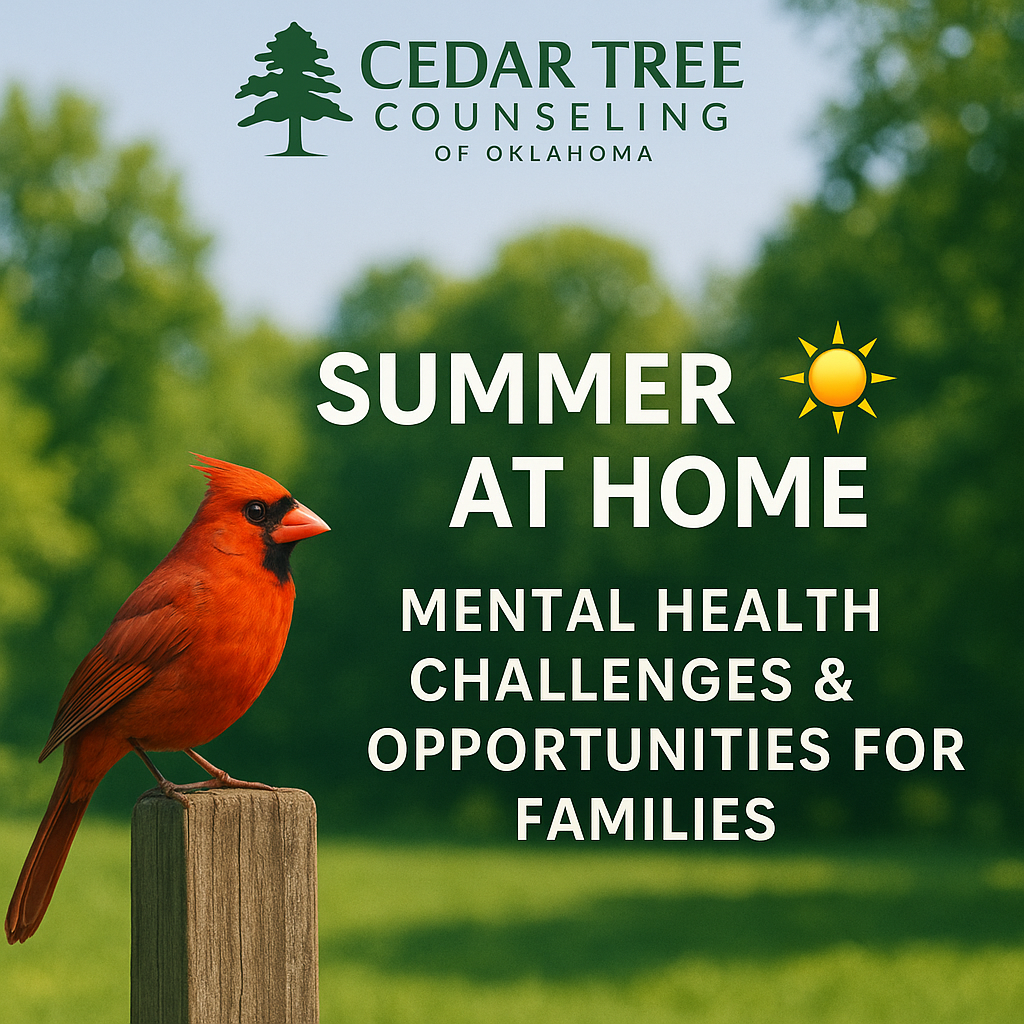

Summer at Home: Mental Health Challenges & Opportunities for Families
- News
- July 14, 2025
Summer at Home: Mental Health Challenges & Opportunities for Families
As summertime unfolds in Oklahoma, kids are at home, routines dissolve, and families settle into a new rhythm. While it’s a season filled with joy, it also brings unique mental health challenges for both children and parents.
1. Loss of Structure — A Double-Edged Sword
-
For kids: Without school routines, children face the “Summer Scaries”—worries stemming from boredom (34%), disrupted sleep and daily rhythms (26%), and excessive screen time (38%) Harvest Counseling & Wellness+1McLean Hospital+1Kids Mental Health Foundation.
-
For parents: Juggling full-day childcare demands, often while working or managing home life, leads to stress and fatigue—commonly called parental burnout .
2. Boredom and Sibling Tensions
Unstructured time may spark creativity…but too much can trigger restlessness, sibling squabbles, and even anxiety in children PMC+15Parents+15Rogers Behavioral Health+15. Parents often report higher conflict levels during summer compared to the school year.
3. The Screen Time Quandary
More idle hands mean more screen time. While digital devices fill the gap, they also disrupt sleep and limit face-to-face connection. Balanced, mindful usage must be part of any summer plan Child Mind Institute+15Kids Mental Health Foundation+15Scientific American+15.
4. Emotional Signals from Teens
Often labeled “lazy” or “moody,” teen behaviors like withdrawn mood, disrupted appetite, or talk of hopelessness may signal deeper issues like anxiety or depression—even in summer .
5. Parental Stress & Guilt
Managing children’s mental health while stifling personal stress takes a toll. Parents frequently experience guilt and feel they’re not doing “enough,” leading to elevated cortisol, irritability, and emotional exhaustion .
Strategies for a Serene, Supportive Summer
✔️ Create a Flexible Routine
-
Keep consistent wake-up, meal, activity, and bedtime schedules for stability Child Mind Institute+1Folsom Times+1.
-
Use visual schedules or a “boredom jar” filled with fun ideas to balance structure and free time Healthy Minds+1Child Mind Institute+1.
✔️ Build in Real Responsibility
-
Encourage kids to contribute: simple chores or planning a family lunch boosts independence and well-being.
-
Offer teen “summer jobs” or community projects to foster purpose and reduce screen-bound idleness Kids Mental Health Foundation+2The Times+2The Times+2.
✔️ Prioritize Outdoor & Social Time
-
Outdoor play, camps, libraries, and community programs help maintain connection and support mental health .
-
Aim for tech-free adventures—nature builds resilience and social skills The Times+1Houston Chronicle+1.
✔️ Listen, Validate & Monitor
-
Be alert to warning signs: mood changes, appetite/sleep disruptions, withdrawal, irritability .
-
Validate emotions (“I hear you feel bored…”) and offer coping strategies—journals, drawing, or talking it out.
✔️ Look After Yourself
-
Accept that summer can feel overwhelming—self-care is not selfish Parents+9Harvest Counseling & Wellness+9Rogers Behavioral Health+9.
-
Parents should set realistic expectations: maybe 1–2 structured activities weekly is enough Harvest Counseling & Wellness+1Parents+1.
-
Practice stress-relief: short walks, simple meals, proper sleep. Therapy or peer support can be a lifeline .
Cedar Tree Counseling’s Approach 🌳
At Cedar Tree Counseling of Oklahoma, we partner with families to:
-
Craft sustainable summer routines tailored to your child’s developmental needs.
-
Teach conflict-management techniques for sibling struggles.
-
Guide families in setting screen-time limits and incorporating quality digital breaks.
-
Provide parent coaching in emotional regulation and reducing parental guilt.
-
Deliver individual and family therapy when summer challenges begin affecting daily functioning.
Let’s Grow Together This Summer
Summer at home isn’t just downtime—it’s an opportunity. With a few grounded routines, mindful check-ins, and moments of intentional connection, you can transform the heat of July into a nurturing season for your family’s mental wellness. Cedar Tree Counseling is here to support every step of the way—contact us to build a summer plan that nurtures both children and parents.
References
-
Ipsos/Kids Mental Health Foundation summer survey New York Post+9Kids Mental Health Foundation+9Child Mind Institute+9BetterHelp
-
Child Mind Institute’s summer strategies Child Mind Institute+1en.wikipedia.org+1
-
Research on parental burnout (Rogers Behavioral Health; Harvest Counseling) washingtonpost.com+6Rogers Behavioral Health+6Harvest Counseling & Wellness+6
-
Teen summer mental health (McLean Hospital) McLean Hospital+1Harvest Counseling & Wellness+1
-
Parent/child anxiety triggers: sibling dynamics & lack of routine McLean Hospital+4Parents+4washingtonpost.com+4
